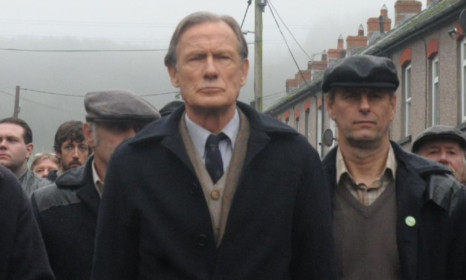
Quietly spoken and reserved it’s hard to imagine Bill Nighy getting too excited about anything.
But when he was asked to be part of Pride, a film telling the extraordinary story of the coming together of the gay rights movement with a South Wales mining village during the 1984 miners’ strike, he admits he did a leap of joy metaphorically, at least.
“I knew nothing about the story and I’d never met anyone else who did, apart from the people that were involved and Steven Beresford, the writer of the film,” the actor expands.
“But my reaction to his script was that it was one of the best things that I’ve ever read in my life.
“It’s amazing, given that it’s such a great story, that nobody knew of it, and I was beyond keen to be part of it.
“It’s not often you read something that makes you grateful, but that’s what I felt.
“I was thankful someone had taken the time to write something that is going to move people, make them laugh and is about something important.”
Touched by the plight of the miners and feeling as though they had a common foe in the 1980s Conservative Government of Margaret Thatcher, a London-based group calling themselves Lesbians and Gays Support the Miners (LGSM) began fundraising on their behalf.
But political affiliations apart, the links between the two groups were thin on the ground with attitudes towards homosexuality openly hostile in the masculine world of coal mining.
As such, LGSM’s offers of help were turned down by the miners’ union, so a minibus full of the most stubborn members set off to a remote village in Wales to hand over the money in person.
That began an unlikely year-long tale of friendship and solidarity, during which LGSM became one of the biggest fundraisers for the miners in the whole of the UK.
“Two of the great developments of my lifetime that make you feel obscurely proud are the Civil Rights Movement in America and the emancipation of gay men and women,” says 64-year-old Bill, who has one daughter from his 27-year relationship with actress Diana Quick.
“Of the greatest achievements of my generation, those are the two things you’d think of first.
“When I was a young man you could get seven years in jail for any public demonstration of affection if you were gay.
“Someone only needed to say they had seen you. They could lie and they would be believed. It’s not greatly to our credit as a society.
“And then we have the miners’ strike, which was so badly presented at the time, so little real information about it and so little enthusiasm for the truth.
“To have that represented accurately, and to have those two stories the miners’ strike and the history of British gay culture dovetail in such a sweet way is exquisite.”
Despite the subject matter, the film packs in plenty of laughs, something the actor is equally as passionate about having recently announced he wouldn’t perform in any plays without jokes in them.
“Humour is not only very important, it’s also good manners,” he says.
“One of the reasons I said I don’t want to do plays with no jokes in them anymore is because it’s bad manners to ask people to sit in a dark room for two hours and not tell them a joke.
“But not many people can write real jokes, and I’m not talking about knee-jerk reactions to certain words or bodily functions. Real jokes are like good poetry, good blues music, good painting not many people can do it.”
And although the striking miners failed in their aim to stop the pit closures, unabashed Bill believes audiences will go home feeling uplifted by the film.
“Audiences will have their sense of humanity refreshed and they will feel considerably better when they leave the cinema than when they went in.”
OUR VERDICT: 4/5
It has been a while since The Full Monty and Brassed Off but by returning to the era in which they were set, this film not only follows in the tradition of British comedies set against a bleak political outlook, but deserves to be rated alongside them.
The serious subjects of AIDS, homophobic assaults and the decimation of century-old communities are all mined for humour, but in such a light, inoffensive way that your overriding reaction is to be charmed by every 120 minutes of it.
It’s no sin to say everyone involved should be proud of their work.
Pride is at cinemas now.

Enjoy the convenience of having The Sunday Post delivered as a digital ePaper straight to your smartphone, tablet or computer.
Subscribe for only £5.49 a month and enjoy all the benefits of the printed paper as a digital replica.
Subscribe